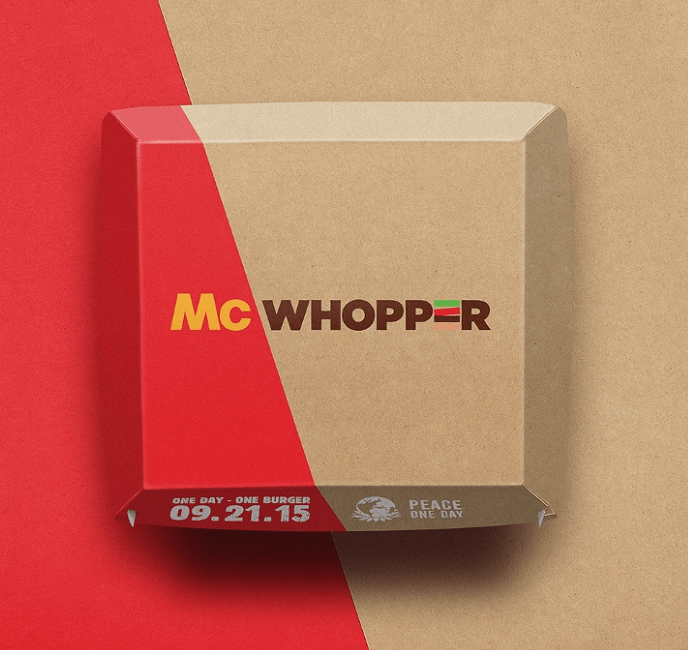You have probably seen the news that this week Burger King ran full-page ads in The New York Times and Chicago Tribune (the hometown paper of McDonald’s) inviting McDonald’s to join forces for a good cause. Burger King proposed a hybrid burger between the competitors to celebrate International Peace Day. McWhopper, a combination of McDonald’s Big Mac and Burger King’s Whopper burgers, would be sold for one day in one pop-up store in one city. Proceeds would benefit the anti-conflict nonprofit Peace One Day.
Some have called this a publicity stunt while others are saying that this is a genuine effort towards promoting peace and benefiting a goodwill organisation. But when your peace campaign starts with a heavily branded website and branded full page ads, you can see why some would call it a stunt.
What is certain is that this is very clever PR for Burger King. Burger King temporarily lost its ranking as the world’s No. 2 burger chain last year, and is not close to being compared to the market share and success of McDonald’s.
In this campaign, they are positioning themselves as equal rival with the world’s number one burger chain, labeled by Forbes as the world’s sixth most valuable brand.
In fact, in the open letter published in their ads and on the dedicated http://mcwhopper.com/ website, Burger King tells McDonald’s: “We know we’ve had our petty differences, but how about we call a cease-fire on these so-called ‘burger-wars’?”
The language indicates that McDonald’s see Burger King as a threat.
The reality is that Burger King has been losing market share to McDonald’s and other fast food franchises. Some say this is due to Burger King’s lack of ‘healthier choice’ foods on its menu, but regardless of the reasons, this campaign has made its brand more relevant and rejuvenated the public’s interest in it.
Here’s some stats on the two burger chains:
|
|
So when Burger King approaches McDonald’s with cheeky language like ‘We come in peace’ as though McDonald’s is engaged in serious warfare with a burger chain that is on a very different playing field, what should be McDonald’s response?
Think about it: If McDonald’s accept the invitation they look like a lesser brand. If McDonald’s don’t accept, they look like a lesser brand. Let’s look at some scenarios:
If McDonald’s accept the invitation, Burger King would still get the credit for being the brains behind the idea, as well as the two brands being aligned together as equals.
And if the McWhopper tasted better than both the Big Mac and Whopper would that weaken the popularity of one or both of the burgers?
If McDonald’s responded to Burger King to say that they like the idea of collaborating on a meaningful project and invite them to support McDonald’s House or McHappy Day, that would come across as arrogant but also remind the public that McDonald’s is interested in charitable work and has been long before Burger King’s proposal. That would likely put an end to Burger King’s campaign and weaken its position in the campaign a little.
A less arrogant response would be to say, “Hi Burger King, we like that you are wanting to support a good cause. But let’s do something more meaningful.” This gives McDonald’s the platform to call the shots but also leaves the ball in Burger King’s court where there is opportunity for further positive publicity for Burger King. It does on the other hand position McDonald’s as charitable but not at the mercy or equivalent position to Burger King.
So what did McDonald’s do? They said no. And boy, did they say no.
They posted the following reply on Facebook (compared to Burger King’s paid ads, dedicated graphics and tumbler website):
Sure McDonald’s could have injected more humour or fun into its response, but the CEO’s reply certainly shuts down any consideration that Burger King are equal to McDonald’s and also throws a damper on the grand campaign by suggesting that if it was a meaningful effort to make a difference (rather than a PR stunt) the advertisements, media relations, website and marketing would not be needed, and they could have discussed the concept directly. By reminding Burger King that International Peace Day is bigger than a burger comparison, it makes Burger King’s hype look a little silly.
McDonald’s has since received scorn on social media and some negative comments in popular media. Burger King continues to receive huge amounts of free publicity, praise and has been positioned as fun, relevant and popular. This isn’t the first time Burger King has harnessed PR for free promotion of its business.
Will this hurt McDonald’s sales? Maybe, but not by much. McDonald’s may look arrogant to some as a result of its response, and according to Spredfast, Burger King has been mentioned in social media conversation 42 per cent more than McDonald’s – but it is still the world’s number one burger chain.
International Peace Day is on 21st September 2015. McDonald’s still have time and opportunity to craft a clever PR response. Such as an un-promoted grand meaningful gesture towards peace on 21st September that isn’t preceded by fanfare or promoted in any way by McDonald’s. While Burger King are suggesting one pop-up store, McDonald’s are busy doing something practical or fundraising for much bigger impact to benefit global peace efforts, without all the publicity. Or making good on the CEO’s note to Burger King stating that they would be in touch, and then challenging Burger King to participate in a better idea.
So Burger King, this is brilliant PR. But watch out because if McDonald’s are agile and smart, it still has an opportunity to come up with a better response and PR campaign. And in the mean time, International Peace Day is getting greater awareness (although not as much publicity as Burger King has received).


